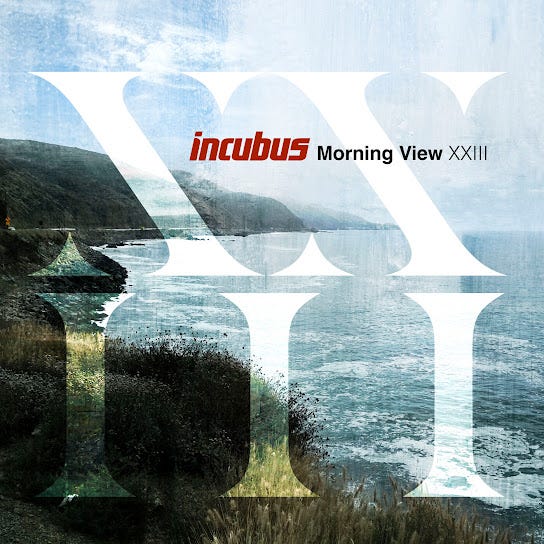Morning View XXIII is great - but what is it exactly?
Incubus re-recorded their most successful album from scratch. Um, why?
I have to be honest with you, I’ve been unreasonably distracted by the main question posed by Incubus’ wholesale recreation of (arguably) their best and (easily) most successful album: why did they do this?!
If you missed it, nu-metallers turned alt-funk-rockers Incubus - a group who always seemed more talented and creative than their peers (*cough* Limp Bizkit, Linkin Park, et al) - made the intriguing decision to release a completely re-recorded version of their 2001 album Morning View. Not a remastered version, a completely re-recorded, play-all-the-instruments-again, I’ll-sing-it-again, lets-make-some-mixing-changes re-recorded version.
Don’t get me wrong: I like it. Earlier this week, listening to it and reviewing it, I wrote that ‘new bassist Nicole Row is a massive upgrade for the group, and singer Brandon Boyd sounds better here than on the original, before concluding: ‘As a whole, I would say that Morning View XXIII is actually better than Morning View’ - which is something I still stand by.
But it isn’t really clear why they did this.
The history of artists re-recording their work is scant. Most famously, Taylor Swift has been re-recording her old Big Machine Records albums as a way of reclaiming the master recordings of her work and better controlling how and where they are used. And, I assume, making more money off them.
(As a side note, Prince tried a variation on this: part of the reason he adopted a symbol in lieu of a name was to try and take control of his recordings - the logic being that if he wasn’t recording under the name Prince, his work was outside the contractual agreement. It didn’t work, but it was a creative solution.)
There are a few other examples: The Everly Brothers re-recorded some of their hits after a move to Warner Bros Records in 1960 so they could be included in a greatest hits compilation; and Def Leppard re-recorded some of their biggest songs (including “Pour Some Sugar On Me” to better take advantage of digital revenue, referring to the re-recordings as ‘forgeries’.
One of the other major reasons for re-recording is better use of technology, starting with re-recording to switch from mono recordings (both left and right play the exact same audio) to stereo recordings (left and right can differ) - a trend which picked up in the mid to late 1950s. And interestingly, a number of artists re-recorded songs for inclusion on Guitar Hero and Rock Band franchise entries, including Living Colour, Motorhead, Aerosmith and R.E.M.
(I’m not including alternate versions of albums where the artist re-records to do something different - Manchester Orchestra’s acoustic focused Hope, Car Seat Headrest’s full band version of Twin Fantasy (Face To Face), or even Ryan Adams’ cover of Taylor Swift’s 1989.)
Incubus singer Brandon Boyd actually has his own SubStack page, and has spoken there about the bands’ thinking. Writing there in November last year (link below), it didn’t really make anything clearer:
From the artist’s POV, the express reason to ‘re-record’ being that most, if not all of us don’t own our master recordings and likely never will. But in the case of some legal loopholes in older recording contracts, after a couple of decades we, the writers and performers of said music, gain the right to re-record and re-release the material and this time around actually own and control the master recordings.
… before adding in the next sentence:
I wasn’t thrilled about the idea of attempting to make a new version of something that is over 20 years old, already feels finished, and is enjoyed/adored(?) at a relative scale
… then saying:
as a band we decided to swing away and give it the ol’ “fuck it!” approach that has been so rewarding to us historically
Boyd wrote about it again in February (link below), and expanded a little more on the thinking behind what they were doing:
Why? OK, so beyond the criminally uninteresting language of “re-record rights” there was a creative challenge here in the attempt to reimagine something we made so long ago that became a soundtrack of sorts to our own experiences but as well to the lives of so many people who allowed this album to penetrate beyond mere casual listenings.
So there you have it, from the mouthpiece of the band itself: some combination of finding enough of a challenge in re-recording this landmark piece of work they’d created to make it worthwhile doing it to reclaim rights to the work itself.
The secondary question here is: how should we feel about it as fans?
I don’t know if I have a satisfying answer to that question. We’re left with two versions of an album that - while I prefer the newer version, having grown up listening to Incubus - really don’t differ much. The new version isn’t different enough or that much better to justify its existence from a creative perspective.
And which version should I be listening to as the definitive edition of the record. Taylor Swift is clear on which she considers the version of her work, but Incubus doesn’t seem all that bothered by it. Presumably they’ll make more money from the newer version, but they aren’t exactly out in public insisting we all listen to the new one over the old one.
Which, I guess, takes us back to the start: why bother doing it?
Five Songs Worth Checking Out!
Guitar Hero’s best tracks edition
> Killswitch Engage - “My Curse”
The heavy hitting ballad featured a long section where you had to focus on playing the same three notes on a loop for almost a minute, making it tricky to make it to 100% on the track in Expert mode.
> Living Colour - “Cult Of Personality”
The second lead break in the track was almost impossible to get all the way through. I never managed to 100% this one.
> Lynyrd Skynyrd - “Free Bird”
Another song that was so long and tricky that I don’t believe I ever mastered it.
> Weezer - “My Name Is Jonas”
Not only is this arguably the best Weezer song, it was also hella fun to play.
> The Fall Of Troy - “F.C.P.R.E.M.I.X.”
One of the most hectic songs the series ever included - and this one was added as a bonus track in Guitar Hero III. Another tricky one, too.
Thanks for reading everyone - I’ll be back in full swing this week with some coverage of the Aotearoa Music Awards and my week in music (as always).
Have a great weekend!
Chris







